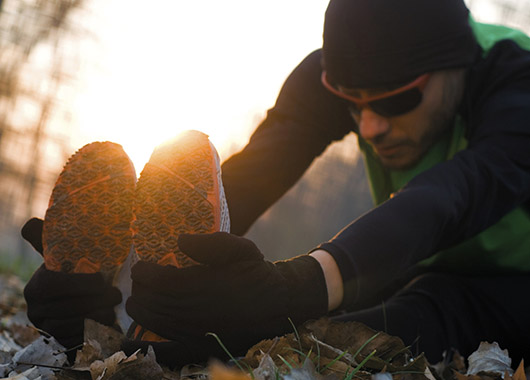
As the rock we live on angles away from the sun, there’s two things that are certain: it’s going to get darker and it’s going to get colder. Your circadian rhythms (which help you sleep and wake) are going to be thrown out of sync. And when icy rain is coming down in sheets, not one particle of your being is going to want to step out into a dark evening for a run. But you can change this! Fight back and you’ll keep on top of your training, and reap the rewards in the spring. Are you ready?
1: Eat right, train well
Emma Patel, a healthy eating advisor, believes a good diet is key. “Eating the right amount of protein helps to balance blood sugar, which in turn avoids energy fluctuations,” she says. “Also, avoid processed ‘white foods’ that are high in refined sugar. Select lower glycemic index grains such as whole grains that have not been refined [eg kamut, spelt or 100 per cent whole wheat], sweet potatoes and brown rice to keep your energy up.” This will avoid the ebbs and flows of high sugar energy bursts and subsequent dips. We all know that once the summer ends, there’s a temptation to ditch the salads and fill up on starchy foods. “You’ll have more energy, though, if you include plenty of fruit and vegetables in your comfort meals,” advises Emma, “and try to eat raw wholefoods as much as possible rather than the processed stuff.”
2: Supplement for strength
Even if you have a balanced diet, it may be worth considering a probiotic. “Those with an imbalanced gut flora tend to experience more fatigue,” says nutritional therapist Natalie Lamb. “Healthy digestive function, absorption of nutrients and removal of waste could make you feel lighter and more energised,” she suggests. “Try to consume fermented foods or a daily probiotic supplement.” Natalie recommends Bio-Kult, available in most pharmacies (£14.95, www.bio-kult.com).
3: Don’t deplete the D vitamin
Vitamin D levels are often low in those experiencing depleted energy. “The lack of sunshine over the winter months can mean you don’t get enough vitamin D, making you feel tired,” says Emma. “The main source of vitamin D is sunlight, but in the UK we can’t make vitamin D from winter daylight between November and March, so it’s especially important to get vitamin D from your diet.” Good sources are oily fish (salmon, sardines and mackerel), eggs and fortified breakfast cereals. In the last of the summer months, try and top up your fat-soluble vitamin D stores to see you through the winter. “Just 15 minutes of midday sunshine without sunscreen [longer exposure without protection could lead to sunburn and possibly skin cancer] is now recommended,” says Natalie. Running outdoors in your lunch hour will maximise exposure to sunlight and boost your spirits.
4: it’s time to lighten up
One of the main reasons for lethargy during the winter is a condition known as seasonal affective disorder (SAD); nearly 20 per cent of adults suffer mild symptoms known as the winter blues. Over-eating and over-sleeping are the two main indicators. Periods of dark, gloomy weather reduce the amount
of light we receive through our eyes. A body clock that isn’t receiving the right light signals produces more of the hormone melatonin, which leaves you feeling tired, moody and sluggish. Supplementing your diet with 10-20mcg of vitamin D daily may help, as well as sitting in front of a light box, which emits light far brighter than a normal light bulb. Contact the SAD Association (www.sada.org.uk) for a list of reputable suppliers.
5: Boost immunity
One way to ensure you run better in the winter is to eat foods that will strengthen your immune system. Garlic has always been used as an effective natural protector against colds and minor infections, and turmeric also has antiseptic properties. Chilli peppers are a rich source of vitamin C and are thought to have anti-viral properties, while onions contain vitamin C, potassium, fibre and the antioxidant quercetin. Dried ginger is reputed to have a pain-relieving and anti-inflammatory effect. All can easily be added to the dishes you prepare.
WORDS: Tina Chantery






